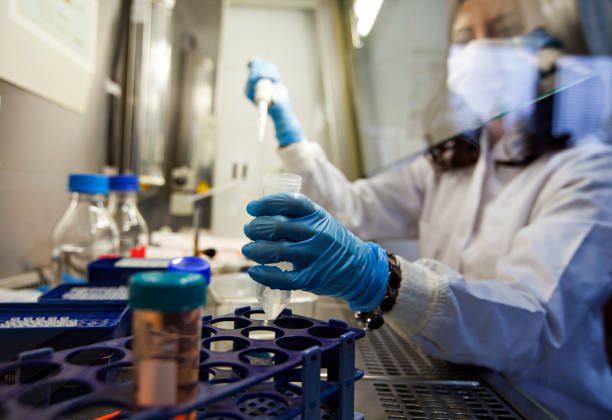
| Cancer Researcher Key Stats | |
|---|---|
| Avg. Salary / year | $64,830 |
| Avg. Pay / hour | $31.17 |
| Education | 4+ Years |
| Job Outlook | 8% |
A Cancer Researcher’s professional life revolves around Cancer: a disease caused by the abnormal reproduction of a single cell.
Cancer Researchers are medically trained professionals that investigate specific cases of the disease in order to understand it and its behavior better.
Cancer Researchers are considered medical scientists.
These scientific professionals research ways to prevent the disease, look for the causes and work towards the goal of eradicating it.
Cancer Researchers will also analyze a variety of medical applications or formulate a drug combination that will help ease or eradicate cancer’s existence.
The majority of these professionals work in research labs at hospitals and universities.
Some are also hired by corporations in the private sector and work for biotechnology or pharmaceutical companies.
Those who want to become a Cancer Researcher require extensive training and education.
Some sought after skills include having great skills in both writing and conversational communication.
Some Cancer Researchers spend a lot of their time writing grants and proposals for fundraising in order for their institution to continue its researching efforts.
Table of Contents
Education Requirements to Become a Cancer Researcher
In order to become a Cancer Researcher, a candidate requires an extensive educational and professional background.
Cancer Researchers typically have a medical doctoral degree (M.D.) or a Ph.D.
in Biological Science.
Candidates with both a Ph.D.
and an M.D.
will have more opportunities and are more likely to get hired.
Students who choose this route can seek both Ph.D.
and M.D.
degrees by getting into a dual degree program at an accredited university or college.
The first step however, is to attend an accredited four year institution to earn a Bachelor’s Degree.
As an undergraduate, someone who wants to become a Cancer Researcher should focus on a scientific track in order to prepare themselves for graduate school.
Students should also strengthen many other traits and ought to take classes in writing, mathematics, physics and computer science.
Having strong writing skills will help a candidate prepare for writing grants, proposals and providing any research results they find.
Helpful majors include:
- Biology
- Molecular, Cellular and Developmental Biology
- Biological Science
Once students are finished with their undergraduate degrees, they can choose from a handful of routes in order to become a Cancer Researcher.
These routes include enrolling into the following programs:
- Ph.D.in the Biological Sciences: This track typically takes six years to complete.Students can specialize in Oncology or Biological Sciences.Candidates with a Ph.D.do not treat patients unless they have an M.D.to supplement their background.
- M.D.this is a medical degree in which the professional is trained and prepared to directly treat patients.However, these candidates can opt to not become licensed physicians and can choose to research instead of a career in clinical practice.
- Joint M.D.- Ph.D.Program: A lot of educational institutions offer dual degrees with the hopes of having students focus on two tracks simultaneously.An M.D.-Ph.D.normally takes 7 to 8 years to complete.Students will learn both the clinical aspects of being a Physician and the researching skills needed to do scientific research
Cancer Researcher Job Description
Cancer Researchers spend their time researching new ways to prevent and treat cancer.
They can work for private institutions such as pharmaceutical companies, universities or nonprofit organizations.
They perform their research in laboratories using certain samples of cancer in order to determine how it acts and what kind of treatments it responds to.
Several clinical trials are needed in order to determine the treatment’s effectiveness and efficiency.
Cancer Researchers working for nonprofit or educational institutions may also perform fundraising efforts in order to accumulate money for further research.
They use the information they have gathered during their research to use as data in their proposals to enthrall potential donors.
Cancer Researcher Salary and Career Path
Candidates with a dual Ph.D.
and M.D.
background are more likely to be competitive in the field.
The research sector is expected to grow faster than average at approximately 40% throughout the next decade, according to the Bureau of Labor Statistics.
Salary and wages depends on the sector a Cancer Researcher works in with drug merchants paying an average of approximately $90,600 annually.
Education institutes pay the lowest wages at approximately $52,800.
These are averages for all Medical Scientists including Cancer Researchers.
![]() The below information is based on the 2021 BLS national averages.
The below information is based on the 2021 BLS national averages.
National Average Salary
$87,820Average Salary by State
| State | Avg. Annual Salary |
|---|---|
| Alabama | $64,830 |
| Alaska | $70,000 |
| Arizona | $66,600 |
| Arkansas | $68,180 |
| California | $100,030 |
| Colorado | $75,220 |
| Connecticut | $70,120 |
| Delaware | $74,300 |
| Florida | $68,370 |
| Georgia | $98,130 |
| Hawaii | $66,780 |
| Idaho | $70,140 |
| Illinois | $77,830 |
| Indiana | $60,290 |
| Iowa | $82,540 |
| Kansas | $60,300 |
| Kentucky | $64,760 |
| Maine | $58,020 |
| Maryland | $100,100 |
| Massachusetts | $118,880 |
| Michigan | $79,640 |
| Minnesota | $81,730 |
| Missouri | $77,730 |
| Montana | $101,370 |
| Nebraska | $76,340 |
| Nevada | $75,590 |
| New Hampshire | $72,480 |
| New Jersey | $90,550 |
| New Mexico | $50,940 |
| New York | $82,260 |
| North Carolina | $80,240 |
| North Dakota | $72,750 |
| Ohio | $59,830 |
| Oklahoma | $49,970 |
| Oregon | $71,830 |
| Pennsylvania | $61,830 |
| South Carolina | $64,750 |
| Tennessee | $96,520 |
| Texas | $62,350 |
| Utah | $62,500 |
| Vermont | $69,840 |
| Virginia | $77,760 |
| Washington | $72,930 |
| West Virginia | $68,920 |
| Wisconsin | $70,060 |
| Puerto Rico | $52,590 |
The top earning state in the field is Massachusetts, where the average salary is $118,880.
These are the top 5 earning states in the field:
* Employment conditions in your area may vary.
Frequently Asked Questions
What does a cancer researcher do?
Cancer researchers are scientists who conduct research on cancer- a disease that appears when some cells start to grow and spread abnormally.
Some cancer researchers study the role genes play in predisposition to certain types of cancers and how treatments can prevent the reproduction of cancerous cells.
Other cancer researchers lead clinical trials to test cancer-fighting medication.
Cancer researchers can work for universities, private companies or not-for-profit organizations.
Like all medical scientists, cancer researchers need critical thinking skills, patience, observation, and data analysis skills but also communication skills.
As a medical scientist, you may also have to write grant proposals to find funding for your projects, therefore you will need the ability to explain and communicate your research project.
This profession needs many years of training and you may have to work long hours in the lab but fighting cancer can be both professionally and personally rewarding.
How much does a cancer researcher make?
According to the Bureau of Labor Statistics, the median annual wage for medical scientists was $84,810 in May 2018.
Salaries in this field vary based on a wide range of factors.
As a cancer researcher, you can earn anywhere between less than $50,000 and more than $150,000 a year.
How much does it cost to become a cancer researcher?
There are several educational paths that can help you become a cancer researcher and costs vary depending on the path you choose.
Cancer researchers typically hold a bachelor’s degree and a Ph.D. in biology or a related field.
Some cancer researchers hold a medical degree instead of a Ph.D. and some hold both a medical degree and a Ph.D.
Bachelor’s degree programs can cost you anywhere between $10,000 and more than $50,000 a year, depending on the school you choose.
Research-based doctoral programs cost, on average, somewhere in the range of $35,000-$40,000 a year and can usually be completed in 5-7 years.
If you choose to earn a medical degree, you should expect to pay around $200,000 or more for medical school.
What is the demand for cancer researchers?
According to the Bureau of Labor Statistics, employment for medical scientists, in general, is expected to grow 8 percent from 2018 to 2028.
As the population ages, researchers will continue to be needed to find treatment for different types of cancer.
As many medical research projects are dependent on federal funding, the demand for cancer researchers can vary year by year.
How long does it take to become a cancer researcher?
Cancer researchers typically need at least 8-9 years of training beyond high school.
If you want to start a career in this field you should start your training with 4 years of undergraduate studies.
Afterward, you can choose to enroll at a Ph.D. program or to continue your medical studies by applying to medical school.
Medical school can be completed in 4 years while Ph.D. programs typically take between 5-7 years be completed.













